Our Planet
Air Date: Week of May 31, 2019
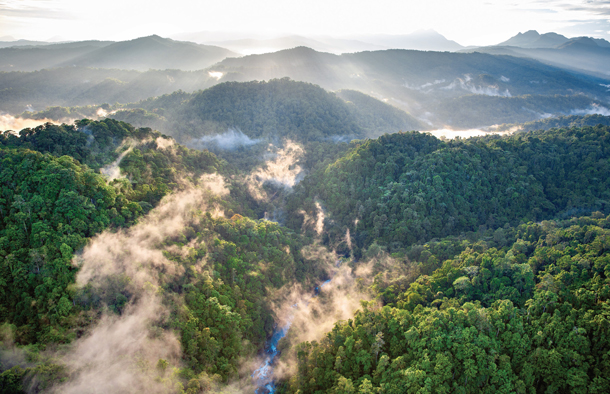
A streamside area of rainforest in Tawau Hills National Park, Sabah, on the island of Borneo. A strangler fig has enmeshed the buttress of a dipterocarp tree more than 260 feet tall. Borneo has the world's tallest rainforest trees—with the tallest being in this park. Borneo’s forests are also the oldest in the world, at more than 130 million years. (Photo: Reprinted with permission from Our Planet, by Alastair Fothergill, Keith Scholey, and Fred Pearce,copyright©2019. Published by Ten Speed Press, a division of Penguin Random House,LLC., CC Huw Cordey)
Our Planet is an inspiring nature documentary series narrated by the renowned Sir David Attenborough. The eight-episode Netflix original provides viewers with majestic scenes of our natural world, through the sobering lens of climate change. Keith Scholey, a lead producer of the series, talks with Host Bobby Bascomb about what it took to produce the series and why Our Planet calls viewers to action.
Transcript
BASCOMB: It’s Living on Earth, I’m Bobby Bascomb.
Netflix recently released Our Planet, an 8-part nature documentary series narrated by the famous Sir David Attenborough.
[OUR PLANET MUSIC]
ATTENBOROUGH: This series will celebrate the natural wonders that remain and reveal what we must preserve to ensure people and nature thrive.
BASCOMB: At its heart, Our Planet is a celebration of the remarkable biodiversity of life on Earth. Each of the 8 episodes explores a different ecosystem and explains the interconnectedness of life in that place. In Antarctica Mr. Attenborough shows us the base of the food chain, a carpet of green algae growing on the bottom of the sea ice.
We see tiny krill come to eat the bright green algae until the translucent animals are green themselves. Then an aerial shot of massive humpback whales working together to blow air out their blow holes and form a perfect spiral.
[OUR PLANET MUSIC]
ATTENBOROUGH: As the spiraling net tightens the krill are driven closer together and then the whales lunge upwards and collect them.
BASCOMB: Just as your reverence for the collected effort of these massive creatures crescendos, David Attenborough delivers the gut punch of reality.
ATTENBOROUGH: In the last 50 years, with warming temperatures and disappearing sea ice krill stocks in this part of the southern ocean have more than halved.
[SOUNDS OF CRASHING WAVES]
BASCOMB: With their food disappearing humpbacks are also in sharp decline. Each ecosystem from the Arctic tundra to a tropical rainforest inspires awe and demands action. Keith Scholey is one of the lead producers of the series and a co-author of the companion book and he joins me now. Keith Scholey, welcome to Living on Earth.
SCHOLEY: Great to see you.
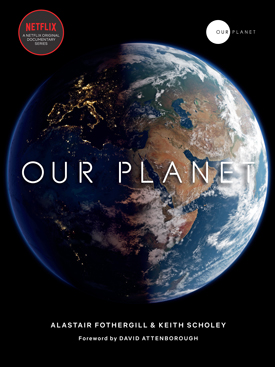
Our Planet is a three-part project involving a Netflix series, a companion book, and an interactive website. (Photo: Reprinted with permission from Our Planet, by Alastair Fothergill, Keith Scholey, and Fred Pearce,copyright©2019. Published by Ten Speed Press, a division of Penguin Random House,LLC.)
BASCOMB: So, a lot of our listeners may be familiar with Planet Earth, a similarly awe-inspiring nature documentary. But, Our Planet also delivers a powerful message about how humans are impacting these stunning ecosystems that you show us. Why take that approach with this series?
SCHOLEY: Well, my colleague at Silverback Films who I jointly made the series with, Alastair Fothergill, he did the original Planet Earth series with BBC. And both of us have been in the natural history business long time, and we wanted to make another big global natural history series. But this time, we wanted it to be about our time, because what has happened, and we've been watching the rapid decline of nature, and the idea of this series is to bring that decline to everyone's attention. Point out what the problems are, but very much also point to the solutions. We feel really frustrated, because you know, the natural world is collapsing for -- I think, doesn't need to, and people often get gloomy and think it's an inevitability. We just need to stimulate the world to do something about it.
BASCOMB: How did you come up with a name for this series? I mean, Our Planet, it implies something that belongs to us that we're responsible for.
SCHOLEY: Yeah, I have to say the Netflix team we work with they, they were the stimulus behind that. We had other ideas to talk about in terms of a title. But, Our Planet really fitted the bill because it is, it is ours. We're in the, what they call the age called the Anthropocene, which is the age of man, which means the world has new management, and that's us. So it's ours in terms of stewards. We have to manage it, we've taken it over. But, it's also our only home. So in a way, it's the title that really, really sums up the message.
BASCOMB: Yeah, we're pretty poor managers, I think.
SCHOLEY: At present, but we're about to get better. And we're going to get better fast. That's just the plan.
BASCOMB: We have to.
SCHOLEY: We have to, we do.
BASCOMB: There's also a beautiful hardcover book that goes along with the TV series. Why make a book companion to go along with this?
SCHOLEY: The project has three components. It has a television series. Then we have a big online site called ourplanet.com, which gives a lot more information about the problems and the solutions. But we very much wanted a book that pulled the two things together into one place. If you read this book, you will get the overall picture of the natural world right now, which is still incredibly rich. But, you'll also get the side that the website talks about, which are the problems and solutions and the way out. So the book, you get the whole project in one.
BASCOMB: How difficult was it to make this series? I mean, you were camped out in some pretty remote and uncomfortable places, I think.
SCHOLEY: Yeah, these wildlife shows are always hard. What happens when you make a wildlife show is you always try to show new things. And to be new, it means that no one's done them before. There's a good reason why they haven't done them before cause they're probably difficult. I often describe making wildlife films like paying off a blackmailer, where the audience is the blackmailer, they say 'Right. Well, we've had that -- show us more.'
BASCOMB: [LAUGHS]
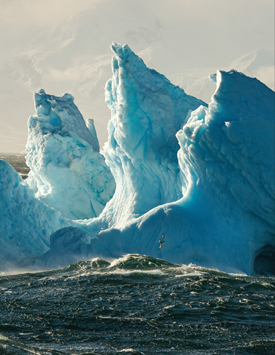
A Cape petrel, hunting krill, skims the waves in front of an iceberg in the Antarctic Peninsula’s Gerlache Strait. (Photo: Reprinted with permission from Our Planet, by Alastair Fothergill, Keith Scholey, and Fred Pearce,copyright©2019. Published by Ten Speed Press, a division of Penguin Random House,LLC., Justin Hofman)
SCHOLEY: And we always want to share more. So there is always that challenge of trying to reveal new things and, and that can be difficult and risky. The other challenge we had was to find that balance of this bigger story. Often with previous natural history shows, we've just gone for stories that really just showed you something new; this time, it had to show you something new, but it had to be a purpose behind it.
BASCOMB: What was one of your favorite or most memorable experiences working on this series?
SCHOLEY: I think the most memorable thing that we actually shot, which is not necessarily my favorite, but we filmed this extraordinary gathering of walrus in the Arctic. Hundred thousand animals on one beach. The total population of pacific walrus is probably only about 120 [thousand]. So you've got most of the global population of this species marooned on one beach. And they're only marooned there because the ice is gone. Because walrus like to live out on the sea ice. They rest on the sea ice and jump off it and forage down. And, they've been driven to this place by climate change. I think that that scene probably epitomizes the state of our planet right now, the future wildlife faces. And it's, it's very, very moving. And, I think that's probably the biggest takeaway kind of moment.
BASCOMB: And, you're leaving out what happens to those walruses on this beach. I mean, I watched that and I thought, oh, there's so many there's so much potential, there's so much possibility, you know, there's so many of them left. And, then, you go on to talk about the fact that there's not enough room. So, some of them are forced up a mountain, you know, here you have these large pinnipeds that are not supposed to be climbing a mountain, and then they can't get down.
SCHOLEY: No, absolutely and, and they literally walk off the cliff trying to get back to the sea. Because these are animals that have no experience of height. This is an environment they're not used to. They've never evolved to go to these places. And, so, these disasters happen. But the overall thing is, is that, them being forced to swim huge distances to these haul out sites is exhausting them. They're all getting in bad condition. And, every year, the ice records are showing that the Arctic ice is disappearing, in 20, 30 years’ time we’ll probably have completely ice free Arctic in the middle of the summer. This is a world that we have not experienced for the last 2 million years. So it's a big change.
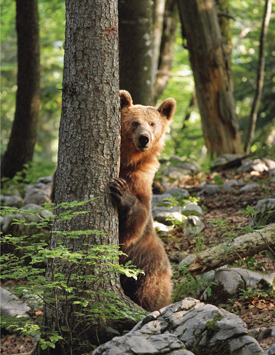
A nervous brown bear peeks out from behind a tree in Slovenia. Its home is mixed deciduous and pine forest in mountains, which has survived logging and where bears have survived persecution. Today,more than half of Slovenia is forested, with a population of about 500 brown bears. Conservationists believe their spread to the Alps now depends on a significant reduction in the numbers killed by hunters and a trans-boundary nature-conservation area being established between Slovenia and Croatia. (Photo: Reprinted with permission from Our Planet, by Alastair Fothergill, Keith Scholey, and Fred Pearce,copyright©2019. Published by Ten Speed Press, a division of Penguin Random House,LLC., Bruno Ca)
BASCOMB: And, what about the emotional toll for you, I mean, for instance, there's a scene where a baby seal gets picked off by a polar bear. And that's nature, that's fine. But then we learn that it was only eaten because the ice season is so short, that the mother couldn't make a proper den for it and protect it.
SCHOLEY: So, if you're going to film natural history, you see suffering, and there's, the natural world has a wonder to it. But it has a cruel side. You get used to some of it, you expect it but it's always hard to watch and hard to be there. And then there's a big decision then about what you show and what you don't show because the audience hasn't seen the full sort of context of what you're watching. It's a little bit like news reporting. You have to be very careful that you tell an accurate story, but you don't traumatize the audience in the process. But I think the hardest thing, though, is seeing whole, whole habitats going down the tube. I mean, like coral reefs. We still dive on these amazing reefs, it's harder to find amazing reefs. But the science tells us that in 50 years, they're almost certainly all gone. And that idea that the coral reef habitat of our oceans, we could have removed in a century, and these habitats have been around for at least 200 million years -- is staggering, and very depressing.
BASCOMB: I think really, the take home message from the series for me is that there's so much left, there's so much left worth protecting. Is that how you see it as well?
SCHOLEY: Completely! And, the thing is, it's not nice to have. The thing about life on earth, it gives stability to the earth. This earth without life went through billions of years of being a raging monster. And finally, life actually calmed it down and brought about stability. And it’s this iterative process, that as the world becomes more stable life becomes more complex, and that makes it more stable, da-de-da-de da. And, the moment humans stepped foot on this planet, the planet was probably at its most stable it's ever been at. And we've only been able to have agriculture and everything like this, because of the stability nature gives the world. If you start taking that stability out, I mean, our agricultural systems won't function. If rainy seasons and seasons go all over the shop. It doesn't work like that. So we have to partner with nature. So conservation is now not about not to have-- it is an essential part of what we need to drive the system that we've thrived on. I think we have to get that message through really, really hard. And there's kind of a sense of, oh, 'Isn't it sad that all these things are going extinct?' Yeah, it's really sad. It's really sad for us. Because if they go extinct, they go unstable. The ocean goes unstable, the atmosphere becomes unstable, the soil becomes unstable. We can't function like that.
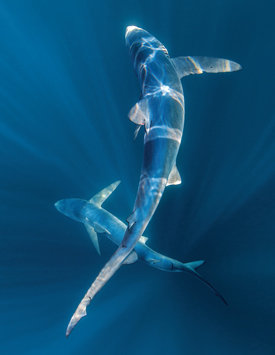
Blue sharks—the most abundant and widespread oceanic shark but also the most heavily fished. About 20 million are caught every year, in drift nets and especially on longlines set for other fish, such as swordfish or tuna, and the unrecorded catch may be a third more. Though blue shark meat is considered almost worthless and most bodies are discarded at sea, there is a lucrative market in the fins. As with so many oceanic fish species, there is no accurate population estimate, and much is unknown about its biology, but declines are being observed across its range. (Photo: Reprinted with permission from Our Planet, by Alastair Fothergill, Keith Scholey, and Fred Pearce,copyright©2019. Published by Ten Speed Press, a division of Penguin Random House,LLC., Oliver Scholey)
BASCOMB: I think that's what's really special about this series to me is that you see the big picture, you see the, you know how ocean currents work together to feed different ecosystems. And then you also tell these tiny stories of a mushroom, and a single bird. Which are, you know, of course, illustrative of the whole. And I think that's really a powerful aspect of it.
SCHOLEY: It's the tiny stuff, often that binds the complexity together, which gives nature its strength, and brings stability to the planet. And so often, I think people forget. I mean, there's a huge disaster happening with insects being wiped out, largely by pesticides. But it's the little guys, the insects and what have you that bind our world together. And you never know at what point you're going to really miss them, but we will miss them. They do so many sort of complex functions.
BASCOMB: And, of course, this series came out just before the United Nations biodiversity report was released. And that report estimates that as many as a million species will go extinct in the next few decades as a result of human activities. Does that add a sense of urgency to you for this project?
SCHOLEY: Yeah, the whole thing now is about time. And the series took us four years to kind of make it so you know, good third of the barrier reef bleached and died. You know, this is possibly the biggest ecological catastrophe in the history of humanity. And it almost went by without a whimper. And you think, Wow, it's happening so fast, and we haven't even got the series out. Yeah, time is not on our side now. I think, you know, most scientists, most people who know about this would agree the next 10 years are crucial to be able to start turning things around.
BASCOMB: How do you hope that people might react to watching this series or reading the book?
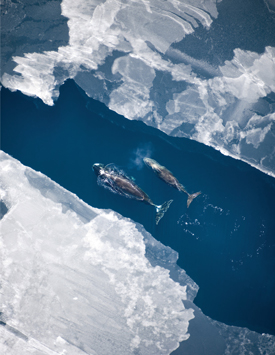
A bowhead whale and her calf surface in the Arctic Ocean ice off the northern coast of Alaska. Bowheads live among the ice floes, feeding on planktonic animals such as copepods. Extremely thick skulls allow them to break through seven-inch ice when they need to create breathing holes. (Photo: Reprinted with permission from Our Planet, by Alastair Fothergill, Keith Scholey, and Fred Pearce,copyright©2019. Published by Ten Speed Press, a division of Penguin Random House,LLC., Amelia Brower, NOAA Fisheries Service)
SCHOLEY: I hope, first and foremost that people are inspired by the fact there's still fantastic things in the sort of natural world. You know, that's, that is the basic thing, if you're inspired by it, you value it. The next thing is I hope people will have a positive view that nature is important to us as individuals. And there's so much that can be done to make it better. Some of the things that are happening to our world right now are just crazy. They're stupid. You take the open ocean, you know, it is being destroyed by a bunch of fishing fleets run by a handful of countries working unprofitably, those fleets are subsidized. And all they are actually catching are luxury goods. Shark's fin. That's to add a texture to a soup. We're killing 100 million sharks a year. That's a billion sharks a decade. And that is undermining the biggest carbon sump we possibly have to fight climate change. This is ridiculous. And I just hope that people will, will understand that the destruction of nature, there's so many elements of it, it's ridiculous. We'll look back on this, like we look back now on-- we were destroying the whales of the world. And in 1986, we just had one meeting. It was the International Whaling Commission. Had a meeting, got together, decided to stop whaling. That decision has brought most whale species, you know, right back. And with that, a more productive ocean. These are the sort of things we have to look at and just say, look, let's stop the silly stuff. Let's, let's move on, let’s sort this. And I hope the project does that.
BASCOMB: For those people that are listening now and watch the series, what do you suggest that they do to take meaningful action to avoid that dark place? I mean, what can one person do?
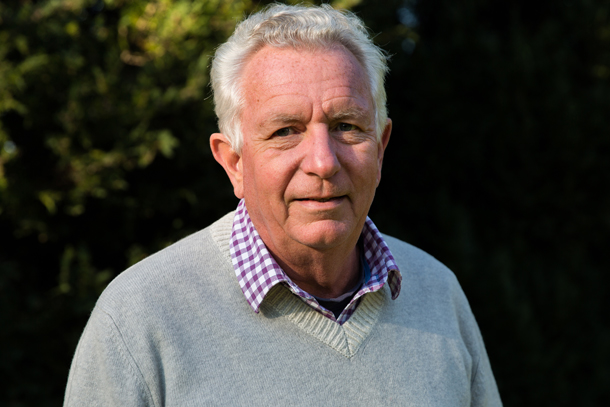
Keith Scholey is co-author of the Our Planet book and one of the lead producers for the Our Planet Netflix series. (Photo: Reprinted with permission from Our Planet, by Alastair Fothergill, Keith Scholey, and Fred Pearce,copyright©2019. Published by Ten Speed Press, a division of Penguin Random House,LLC., Olly Scholey)
SCHOLEY: I think there are two kind of strands to this thing. I think all of us can do small things, we can look at what we consume. And I think there's a huge thing in just -- don't waste. I mean, don't waste energy, don't waste food, don't waste time. I think the most powerful thing we can do, though, is demand things change. Because at the end of the day, change will come about because politicians bring about change. And business leaders can bring about change. And so I think if consumers and voters want change, you start to move the dial. And I think I've really noticed, you know, in the last couple of years, people are really waking up and you get the sense certainly young people want change. They want a different world. I think that's the most powerful thing we can do. You need that public, you know, kick up the backside to say 'Yeah, go for it! We'll support you. We want this.' And, that is changing and that gives me a lot of hope.
BASCOMB: Keith Scholey is author of Our Planet and one of the lead producers of this series. Thank you so much for taking this time to chat with me.
SCHOLEY: It's been a real pleasure.
Links
Living on Earth wants to hear from you!
Living on Earth
62 Calef Highway, Suite 212
Lee, NH 03861
Telephone: 617-287-4121
E-mail: comments@loe.org
Newsletter [Click here]
Donate to Living on Earth!
Living on Earth is an independent media program and relies entirely on contributions from listeners and institutions supporting public service. Please donate now to preserve an independent environmental voice.
NewsletterLiving on Earth offers a weekly delivery of the show's rundown to your mailbox. Sign up for our newsletter today!
 Sailors For The Sea: Be the change you want to sea.
Sailors For The Sea: Be the change you want to sea.
 The Grantham Foundation for the Protection of the Environment: Committed to protecting and improving the health of the global environment.
The Grantham Foundation for the Protection of the Environment: Committed to protecting and improving the health of the global environment.
 Contribute to Living on Earth and receive, as our gift to you, an archival print of one of Mark Seth Lender's extraordinary wildlife photographs. Follow the link to see Mark's current collection of photographs.
Contribute to Living on Earth and receive, as our gift to you, an archival print of one of Mark Seth Lender's extraordinary wildlife photographs. Follow the link to see Mark's current collection of photographs.
 Buy a signed copy of Mark Seth Lender's book Smeagull the Seagull & support Living on Earth
Buy a signed copy of Mark Seth Lender's book Smeagull the Seagull & support Living on Earth

